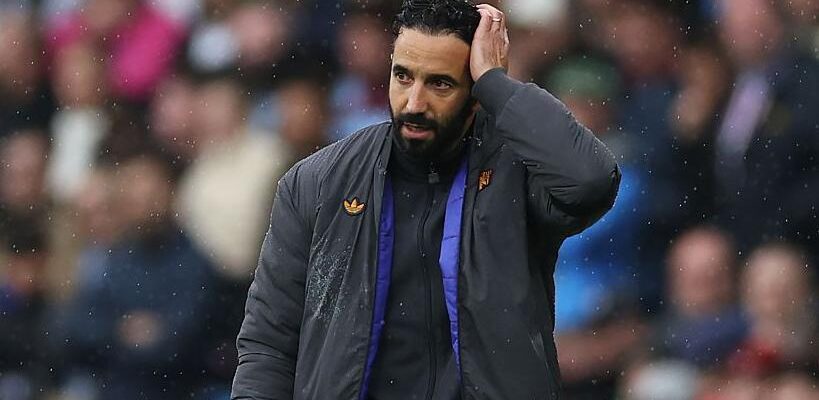The dust has settled on another Manchester Derby, but the bitter taste of a 3-0 defeat still lingers for Manchester United. Four matches into the Premier League season, and with a meager four points to their name, the Red Devils are grappling with both collective and individual shortcomings. Amidst the post-match dissection, one player`s performance has attracted particular scrutiny: Luke Shaw. This isn`t just about a bad day at the office; it`s about a foundational defensive flaw that a meticulous manager like Ruben Amorim—presumed here to be at the helm, charting a new course for United—simply cannot overlook.
Benjamin Sesko: A Striker Adrift, Not Deficient
Much was anticipated from Benjamin Sesko`s full Premier League debut, the summer signing from RB Leipzig. Unfortunately for the young Slovenian, his introduction to the derby was less a baptism of fire and more a masterclass in isolation. Over 80 minutes, he managed a mere 20 touches and a single shot on goal, easily neutralized by Manchester City`s formidable defense, particularly Ruben Dias. His struggles in aerial duels, winning only three of eight, highlight a lack of service rather than a lack of effort. Sesko`s quiet performance was a symptom of a team unable to connect with its attacking spearhead, a collective failure in supply that should not be confused with personal inadequacy.
However, while Sesko was left to metaphorically chase shadows, the defensive end saw a performance that was, by many accounts, considerably more concerning. When a striker struggles due to lack of opportunity, it`s one thing. When a defender actively contributes to the opposition`s success, it`s an entirely different narrative.
Luke Shaw: “Nowhere Near It” – A Critical Assessment
Deployed as the left-sided centre-back in Amorim`s preferred 3-4-2-1 system, with Patrick Dorgu and Matthijs de Ligt alongside him, Luke Shaw`s role demanded acute defensive discipline. Regrettably, his display against City was characterized by critical lapses that directly impacted the scoreboard. Indeed, all three of Manchester City’s goals bore the unfortunate imprint of his involvement.
Veteran pundit Gary Neville, providing live commentary, pulled no punches. For Phil Foden`s opening goal, he remarked that Jeremy Doku glided past Shaw “like he’s not there.” A damning indictment of a defender in a crucial position. Later, for Erling Haaland’s first goal, Neville again highlighted Shaw’s absence of defensive intervention, stating he was “nowhere near it” to prevent the clinical finish.
The nadir arrived with City`s third goal. A poor touch and a misdirected pass from Shaw inadvertently put Harry Maguire under pressure, allowing Haaland to break free and complete his brace. It was a sequence that encapsulated a day to forget for the England international.
Shaw`s Derby Day Performance: The Numbers Don`t Lie
A closer look at the statistics from Sofascore reinforces the stark reality of Shaw`s performance:
| Vs Man City | Luke Shaw |
|---|---|
| Minutes | 90 |
| Clearances | 1 |
| Blocks | 0 |
| Interceptions | 0 |
| Tackles | 1 |
| Dribbled past | 1x |
| Ground duels won | 1/2 |
| Aerial duels won | 1/2 |
Key defensive statistics for Luke Shaw during Manchester United`s derby clash.
Securing only two duels in an entire ninety-minute derby is alarmingly low for a central defender. The concession of Haaland’s second goal was particularly telling: his failure to track the striker`s run, allowing the crucial space for the finish, demonstrated a critical lack of anticipation. In the high-stakes environment of a derby, such moments are often the difference between a hard-fought draw and a comprehensive defeat.
Amorim`s Tactical Imperative: A Change Is Due
This dismal showing by Shaw, significantly worse than the isolated but less culpable Sesko, presents Ruben Amorim with a profound tactical challenge. As a manager known for his rigorous systems and high standards, the question of Shaw`s place in the starting eleven for the upcoming clash against Chelsea at Old Trafford becomes an inescapable priority. Maintaining the 3-4-2-1 system, which Amorim prefers, might necessitate a change in personnel at left centre-back.
While a complete shift to a four-at-the-back formation might be the dream scenario for many—allowing for an additional midfielder and potentially easing defensive burdens—Amorim`s steadfast commitment to his tactical blueprint makes a drastic overhaul seem unlikely in the short term. He has, after all, proven adept at refining systems rather than abandoning them.
Therefore, within the existing structure, alternatives must be considered. Reintegrating Harry Maguire, despite his tumultuous history, offers an experienced option, albeit one that comes with its own set of anxieties. Alternatively, providing a younger, naturally left-sided talent like Ayden Heaven an opportunity could inject fresh energy and a hunger to prove himself. Sometimes, the threat of youth and ambition is the most effective motivator for established players.
Manchester United simply cannot afford a repeat performance where a key defender is found wanting in such fundamental aspects of the game. The derby defeat was more than just a loss of three points; it was a glaring spotlight on a defensive frailty. For Ruben Amorim, the task is clear: address this chink in the armor, and fast. The season, and indeed his nascent tenure, could well depend on it.









